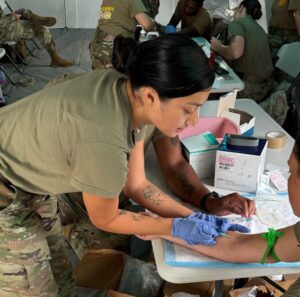April is National Minority Health Month – a time that celebrates the advancement of healthcare for diverse and underserved communities. It is an opportunity to recognize the obstacles minority groups face when accessing healthcare services, including disparities in treatment options and chronic diseases. This month encourages us to think about how to rise above these challenges and discover practical solutions toward achieving greater equity in healthcare outcomes. As a healthcare provider, Maxim is committed to treating everyone equally regardless of race and ethnicity. We celebrate the diversity of our team members, caregivers and patients!
National Minority Health Month
The roots of National Minority Health Month are planted in the 1915 establishment of Negro History Week by Booker T. Washington, a noted African American educator and orator. Washington believed African Americans needed access to educational opportunities, healthcare and improved living conditions to advance economically. In the spirit of Washington’s goals, in 2002, Congress passed H.Con.Res.388 – a resolution establishing National Minority Health and Health Disparities Month to “promote educational efforts on the health problems currently facing minorities and other health disparity populations.”
The National Minority Health Month Foundation leads the month. It aims to address health disparities experienced by minorities in the United States and imbalances in healthcare due to environmental conditions and racial, ethnic, or socioeconomic status.
Common health issues
Unfortunately, race and ethnicity play a role in medical conditions. Some of this is due to genetic factors, but lifestyle habits and access to quality care also play a large part. Health conditions commonly found in minority groups include:
- Diabetes – American Indians and Alaska Natives have the highest risk of developing diabetes. African Americans, Hispanics and Asian Americans are also at increased risk and are more likely to develop diabetes complications.
- Asthma – Hispanics, especially those from Puerto Rico, and African Americans, are more likely to have asthma and develop life-threatening complications.
- Lupus – Lupus is most common in African American women. Hispanic, Asian and Native American women are also at an increased risk.
- Coronavirus – American Indians, Alaska Natives and Hispanics are 1.5 times more likely to contract coronavirus than white Americans. African Americans face a 2.5 times risk of hospitalization than white Americans.
- HIV – Although African American are approximately 13% of the United States’ population, they make up almost half of all new HIV diagnoses. Hispanics are also highly affected by HIV and account for nearly a quarter of all new diagnoses.
- Kidney disease – African Americans, Hispanics and American Indians are most at risk of kidney disease. African Americans are almost four times more likely to die of the disease.
- Osteoporosis – Asian American women are at the highest risk for this disease.
Maxim’s commitment to diversity
Maxim Healthcare Services is committed to diversity and its importance to our mission of enhancing the quality of life within our communities. We are a community of patients, caregivers, customers and team members representing a broad spectrum of backgrounds, perspectives and cultures, and we recognize, respect and celebrate these differences. Diversity and inclusion are woven into the fabric of our company culture, allowing us to continue delivering quality care to the communities we serve.
In addition to our commitment to diversity, we are dedicated to providing quality service. We know that self-evaluation and accountability are essential to maintaining and improving the quality of our patient services. To that end, Maxim has instituted several programs and systems that allow us to continue providing quality service. We have a performance management system, administer patient satisfaction surveys, and conduct internal office audits to ensure patient satisfaction and employee efficiency.
Resources
Several organizations and federal agencies are working to close the gap in health disparities, provide support to members of minority communities and spearhead policy changes. For more information about these organizations and how minority communities can benefit from their efforts, check out these websites.
- Asian and Pacific Islander American Health Forum – The APIAHF influences policy, mobilizes communities and strengthens programs and organizations to improve the health of Asian Americans & Native Hawaiians/Pacific Islanders.
- Indian Health Services – IHS is an agency within the U.S. Department of Health and Human Services responsible for providing federal health services to American Indians and Alaska Natives.
- National Alliance for Hispanic Health – A non-profit, science-based and community-driven organization that focuses on the health and well-being of Hispanic communities.
- National Institute on Minority Health and Health Disparities – NIMHD is one of the 27 institutes of the National Institutes of Health. NIMHD addresses the needs of Americans affected by health status and care delivery disparities – including racial and ethnic minorities, rural populations and populations with low socioeconomic status.
If you need affordable healthcare and aren’t eligible for Medicaid or the Children’s Health Insurance Program, Community Health Centers can help fill in the gaps. These community-based and patient-directed organizations deliver high-quality care to some of the most vulnerable communities in the country. Located in both urban and rural areas, Community Health Centers provide prenatal care, baby shots, general primary care and referrals to specialized care, among other services.
Find your local Community Health Center
For more than 30 years, we’ve been making a difference in patients’ lives by providing excellent service and compassionate care. We offer skilled nursing, physical rehabilitation, personal care, respite care and behavioral care for individuals with chronic and acute illnesses and disabilities. Explore our site to learn more about Maxim Healthcare Services and the care services we provide.



